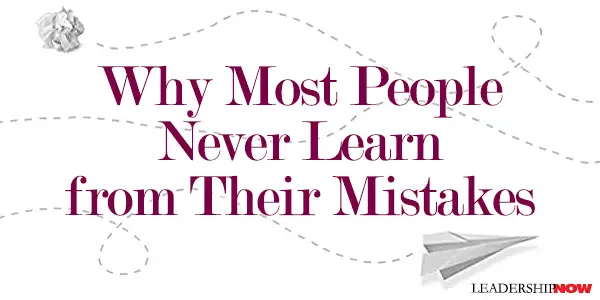 |
 |
01.22.16

Why Most People Never Learn from Their Mistakes
THE purpose of Black Box Thinking is to describe how success happens. Progress hinges on how we react to failure. In two of the most safety-critical industries – aviation and health care – the approach to failure is very different. And the results highlight the problem. For commercial aviation on Western-built jets, they have only one accident per 2.4 million flights. In health care, the equivalent of two jumbo jets are falling out of the sky every twenty-four hours making preventable medical error in hospitals the third biggest killer in the United States behind only heart disease and cancer. The problem lies in how they approach failure. “A failure to learn from mistakes has been one of the single greatest obstacles to human progress.” For all of the talk about not being afraid of failure, we are not learning what we should. Our organizational and personal cultures tend to evade and cover-up the issues. How do we react when something has gone wrong?  The author, Matthew Syed, describes black box thinking as “the willingness and tenacity to investigate the lessons that often exist when we fail, but which we rarely exploit. It is about creating systems and cultures that enable organizations to learn from errors, rather than being threatened by them.” Why? “Failure is rich in learning opportunities for a simple reason: in many of its guises, it represents a violation of expectation. It is showing us that the world is in some sense different from the way we imagined.” Nicely put. Learning from failure is easier said than done. The more we have at stake (especially our egos) the more likely we are to manipulate the evidence. Consider this: When we’re confronted with evidence that challenges our deeply held beliefs we are more likely to reframe the evidence than we are to alter our beliefs. We simply invent new reasons, new justifications, new explanations. Sometimes we ignore the evidence altogether. One of the difficulties we have when analyzing failures (and analyzing success for that matter) is that we rely on information based on hunches. Our intuitions are often wrong. We need to get down to the details so we can isolate the effect of any action so we are solving the right problem. David Brailsford, the general manager of the British cycling Team Sky put it this way: “People think it is exhausting to think about success at such a high level of detail. But it would be far more exhausting, for me anyway, to neglect doing the analysis. I would much rather have clear answers than to delude myself that I have the ‘right’ answers.” An organization (and even individuals) can go on for decades thinking that their success is linked to a particular factor when in reality it is the cause of their failures. And they never make the connection because their assumptions have never been tested or analyzed. We must change our relationship with failure. We are not born with a fear of failure. It’s how we learn. It’s only over time that we are taught a fear of failure and lose our growth mindset. We can only improve in environments where we have the right kind of meaningful feedback. Fear of failure is not the real enemy; it is recrimination and defeatism that often accompanies failure. We need to eradicate blame and encourage growth responsibility. Syed writes: “If we drop out when we encounter problems, progress is prevented, no matter how talented we are. If we interpret difficulties as indictments of who we are, rather than pathway to progress, we will run a mile from failure. Grit, then, is strongly related to the Growth Mindset; it is about the way we conceptualize success and failure.” Through the use of a wide variety of examples, Syed pushes you to think differently about failure and success. More importantly, he teaches us how to look beyond our easy answers and effectively get to the real issues and causations. 
Posted by Michael McKinney at 09:13 AM
|
BUILD YOUR KNOWLEDGE
 

How to Do Your Start-Up Right STRAIGHT TALK FOR START-UPS 
Grow Your Leadership Skills NEW AND UPCOMING LEADERSHIP BOOKS 
Leadership Minute BITE-SIZE CONCEPTS YOU CAN CHEW ON 
Classic Leadership Books BOOKS TO READ BEFORE YOU LEAD |